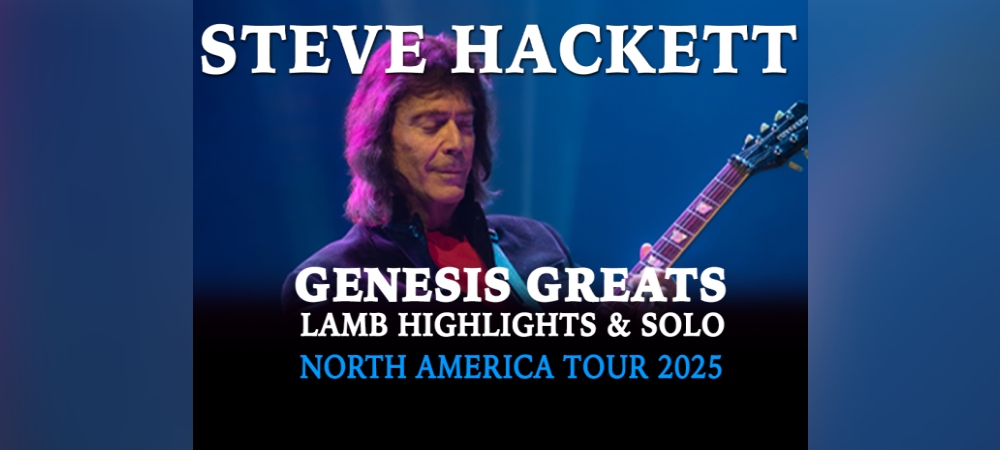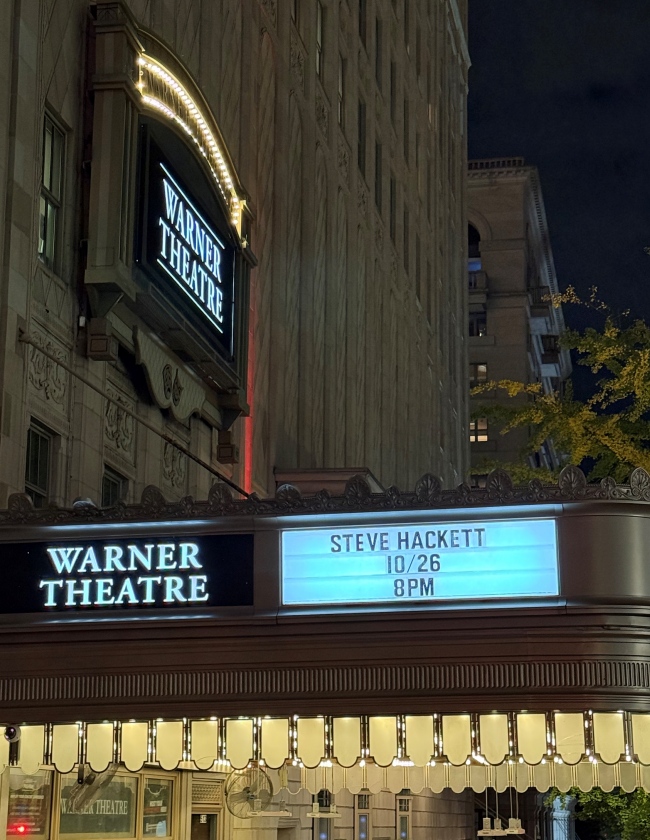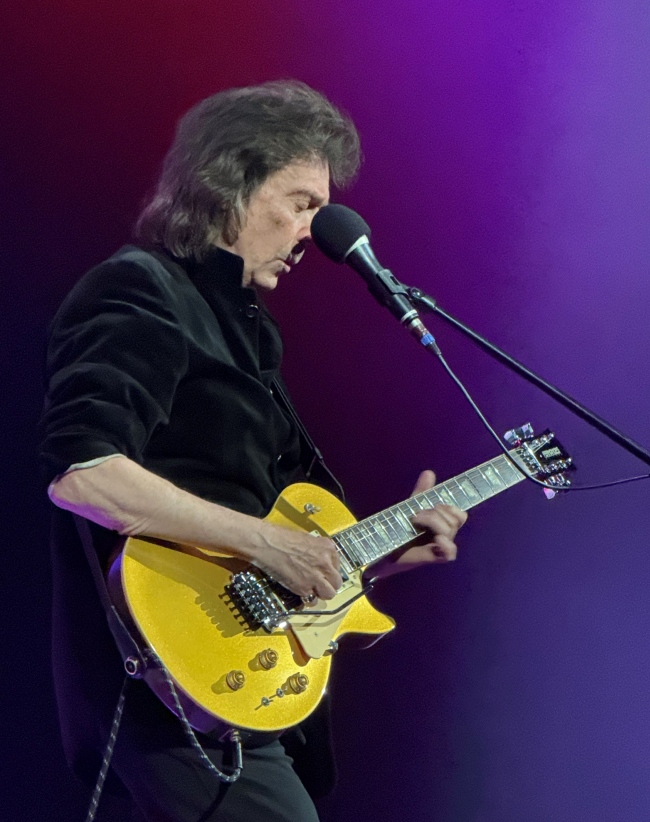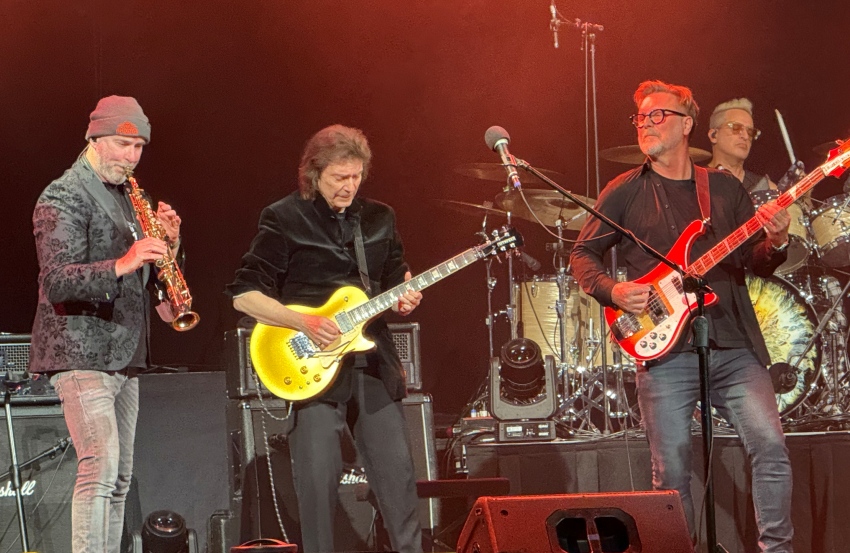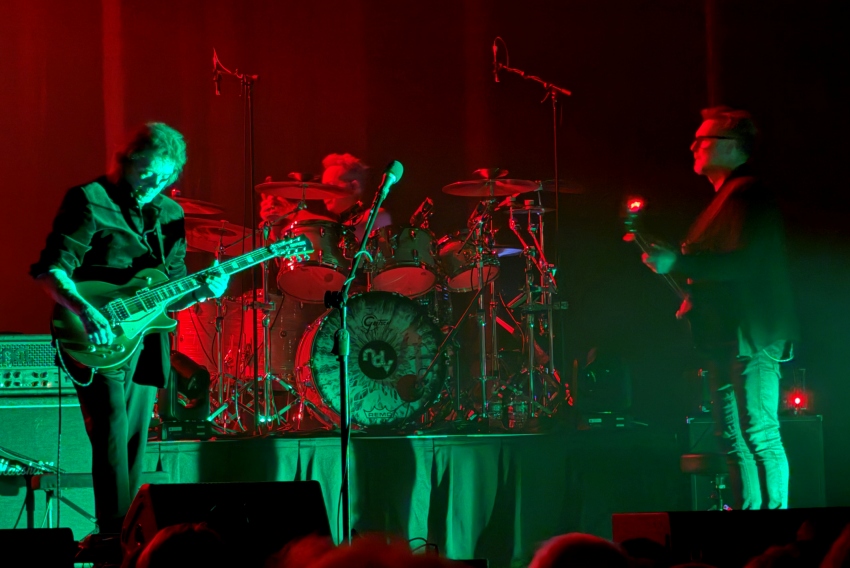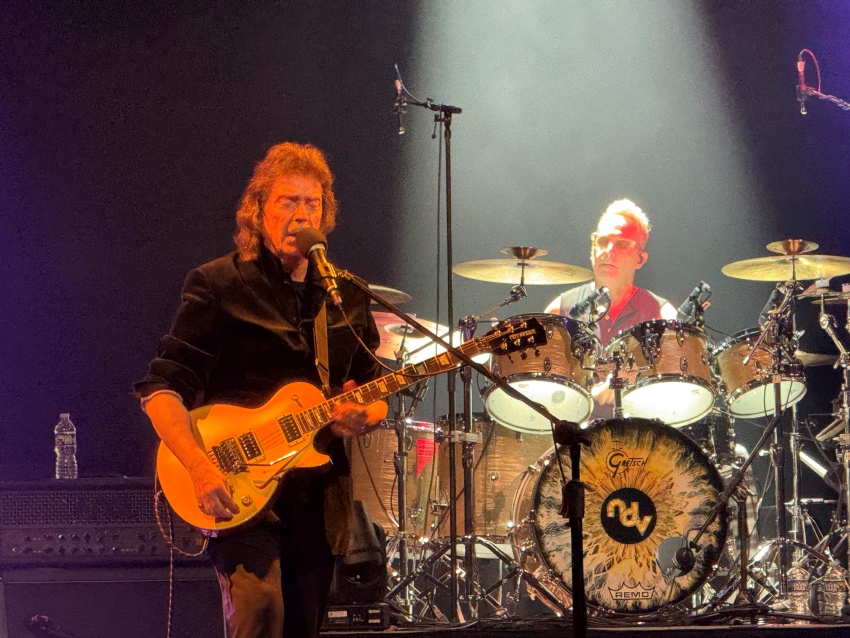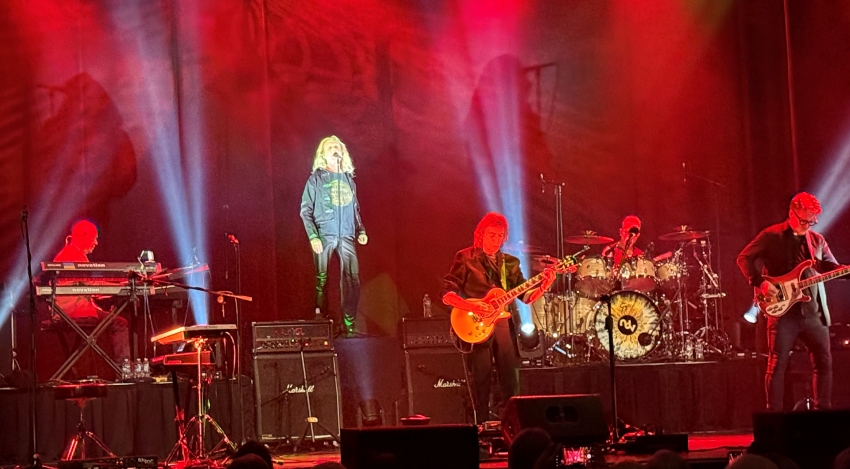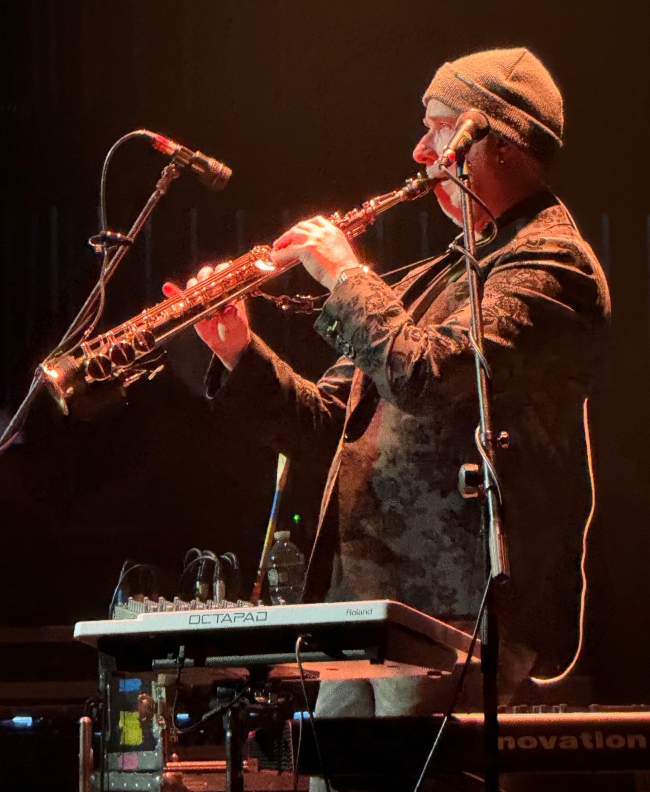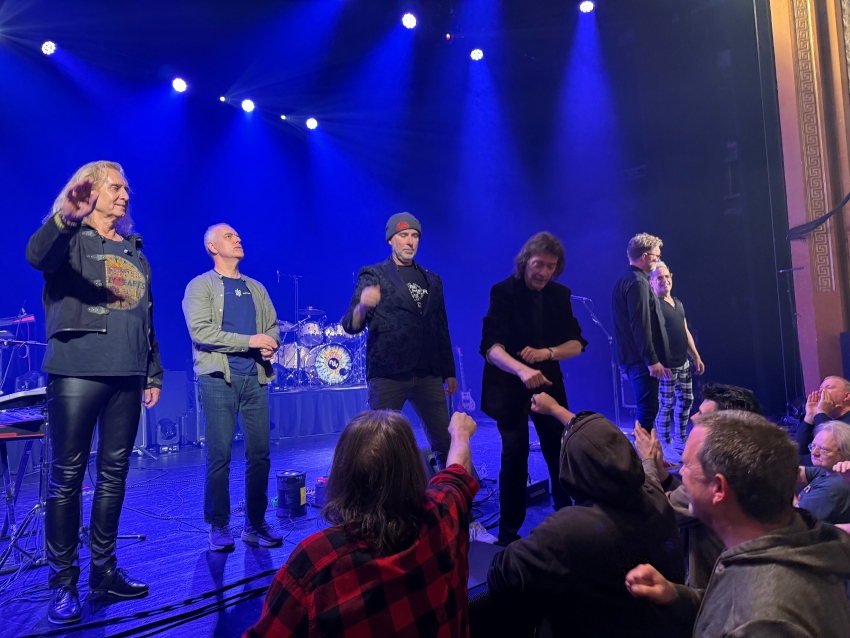Warner Theatre, Washington, DC
Sunday 26th October 2025
When I interviewed Steve Hackett two years ago after he announced his “Lamb Highlights” tour for late 2024, I never imagined I’d be catching the end of it in October 2025. Speaking truthfully – I’m known for my honest reviews after all – The Lamb Lies Down on Broadway is not an album I choose to listen to very often, even when I do get on a Genesis kick. Like a lot of progressive double albums, it suffers from inconsistency; it doesn’t have enough great ideas to fill four sides. Rather like The Astonishing, the band eschewed a lot of the extended instrumentals to make way for storytelling (in The Lamb’s case, a rather surreal, impenetrable story) and the glorious balance from Nursery Cryme, Foxtrot and Selling England by the Pound now felt off.
Nevertheless, I was happy to go and see Hackett’s take on this divisive album, as I was finally living in a city with regular prog concerts once again. Zagreb had been a wonderful home to me for three years, but the only prog concert I saw there was Dream Theater, almost exactly one year ago. Just this month, the Warner Theatre hosted Steven Wilson, Steve Howe’s version of Yes (I refuse to refer to them as simply ‘Yes’) and now Steve Hackett, proving that the prog scene is still alive and well here in the American capital.
It was nice to be coming to a familiar venue; I’d seen Dream Theater on another occasion here back in 2022 in my first show post-pandemic. This time around, I noticed that the venue chose to spell their name with an ‘-re’ instead of the typical American ‘-er’, which piqued my curiosity. Apparently, spelling ‘theatre’ this way sounds fancier.
I was issued a photo pass and had some trouble figuring out where to stand to use it. The last time and only time I’d had a photo pass was for Transatlantic back in 2014, in one of my first reviews for The Progressive Aspect. At that gig, I’d been allowed in front of the guard rail in front of a horde of fans, able to move about freely to capture snaps. At the Warner Theatre, however, there was very little space between the stage and the front row. I desperately looked around for other people with photo passes, but none seemed to exist.
Finally, a theatre staff member explained I could only take photos from the extreme edge of the stage, so I sequestered myself behind a speaker that I hoped wouldn’t blow my ear off when the concert started.
The gig began, and it was something of a whirlwind as I tried to capture great photos of Hackett’s profile whilst moving around the room, going to the back of the theatre so as not to obstruct anyone’s view. The first few songs seemed to be from Hackett’s newer albums, which were unfamiliar to me, so I didn’t feel as if I was missing much by concentrating on photos instead of the music.
When I’d had enough of snapping, I returned to my seat and was surprised to find myself in a row of four empty chairs; this place wasn’t sold out, but the fans who were there were passionate. Steve introduced the band to us and pointed out what a nice theatre this was (the Warner Theatre is beautifully decorated) before explaining the set, saying, “We’ve got some new stuff, then some old stuff, then some even older stuff.” Looking back on the setlist, it seems to have appeared roughly in reverse chronology. He also pointed out (possibly as a disclaimer for fans who hadn’t read the poster properly) that The Lamb would not be played in its entirety, but would only focus on the nine songs that best showcase the guitar, and which also happen to be his favourite.
The band then continued with The Devil’s Cathedral, a track I recognised from my interview when Hackett told me that he deliberately wrote it in the style of Genesis to be fast and furious. As dramatic and full of changes as it was, I really appreciated that this septuagenarian could still compose and play music of such high calibre.
Jumping from this decade all the way back to the 70s, Hackett then pulled out Every Day, a rousing tune that I’d only just become familiar with in preparation for the concert. I’m unfamiliar with most of Hackett’s solo work (he has released nearly thirty studio albums in total), but I’m loath to look up setlists online and see spoilers. Instead, I simply listened to the first few tracks on Hackett’s artist page on Spotify, as these are always the most popular. It’s a no-brainer why Every Day, which opens the Spectral Mornings album, is so popular. After its bouncy, upbeat verse-and-chorus opening half, the remainder of the track is left as a mere vehicle for Hackett to perform searing guitar solos over power chords played on a Mellotron with a choir patch. With its clean guitar sound, it seems like the missing link between classic prog and neo-prog. Enjoying himself perhaps a little too much, Hackett looked like a guitar hero with his resplendent golden instrument in the spotlight.
I reflected on how Hackett had told me he felt much more confident all these years later: “What’s changed for me is that, as a young player, I was struggling to play a lot of this stuff. Now, as an older player, I can get my hands around it. I think technically I’m a better player now than I was then.” Cracking jokes between songs and leading the stage charismatically, this version of Hackett seemed like a different person altogether from the bespectacled young man I had seen in early Genesis concert films, who was permanently sitting on stage. There seemed to be a lot of truth in his self-assessment.
From Hackett’s debut album, the group pulled out an almost unrecognisable A Tower Struck Down, which actually felt a ton better than the original, played with more drama and dynamics and tension. This then gave way to a bass solo played by the formidable Jonas Reingold, who has been involved with more progressive rock projects than I can count. His solo interpolated the Godfather theme before he seemed to play the entirety of Horizons (the short acoustic piece by Hackett on the Foxtrot album), although it was difficult to tell because he played it at three times the original speed. It was a great solo, but I couldn’t stop thinking about the magic of Mohini Dey whilst watching it.
Then, Hackett broke into a distorted guitar solo that seemed very familiar. It was also from his debut, I was sure of that. The whole band launched into a theme that I knew from somewhere. It was only when this theme died down that it became clear; they’d launched into the instrumental outro to Shadow of the Hierophant (the best bit, if you ask me). I wondered how they’d handle it, because everyone who knows the album knows just how repetitive it is. For some reason, there’s also an ‘extended play’ version where the outro goes on for a full ten minutes, making the track clock in at 17 minutes. I like them both, but the lack of a clear resolution in each version leaves them off my list of favourites.
I was actually really impressed with how they handled this live. I couldn’t tell you how many repetitions of the main theme there were, but it felt like the group were able to slowly add more and more intensity with each repetition until the climax brought the song to breaking point. It was handled far better live than it is on the studio version, which seems to simply plateau in intensity and stay there until the fade out.
The biggest part of what made this work was drummer Nick D’Virgilio, who was essentially improvising the entire way through the track, much as Phil Collins was on the original. D’Virgilio, however, was able to show off just how slowly he could ramp up the intensity. With all the other band members playing the same notes over and over, it quickly became the Nick D’Virgilio show, and it was thrilling to watch him go.
Steve Hackett then announced an intermission… in German, for some reason. I decided to head to the bar and grab a brew. I chose a Yuengling and had to fight hard not to drop my jaw when I saw the price: $16.50 (£12.37) plus a tip. It’s getting easier and easier to stay sober. Some consolation was found when I noticed that the can was 24 fluid ounces, which is 709 ml to my metric friends or a pint and a quarter to other Brits.
I then made friends with the audience members sitting in front of me, an older couple who were DC natives. The gentleman told me that the first time he’d seen Steve Hackett was at this very theatre back in 1974 (Google tells me Tuesday, March 5th) when Genesis were touring with material from Selling England by the Pound. It was astounding to think that there was such history in these walls. The band would come back in December of the same year to perform The Lamb in full. I asked him how it was seeing the band back then, and he responded that it was incredible to find a band that could perform so dramatically.
The first half of the set had been devoted to Hackett’s solo work, and the second half would be dedicated entirely to Genesis material. The Lamb section of the evening began, quite logically, with the opening title track, followed swiftly by Fly on a Windshield, a song which showcases Hackett’s talents aptly in the instrumental. It was in this half of the set that long-haired vocalist Nad Sylvan came to life, showing that he could do a fairly good impersonation of Peter Gabriel’s voice. There was a hint of Gabriel’s theatrical performance as well, with Sylvan gesturing throughout the songs or walking dramatically on and off the stage during instrumentals. It wasn’t a full recreation of Gabriel’s erratic movements, which could have come off a bit cringeworthy; it was just right.
Hackett surprised me, though. I was really looking forward to hearing the lengthy, proggy In the Cage, my favourite track from the album, and one that I know a lot of Genesis fans love. I had foolishly assumed it would be on any list of “Lamb Highlights”, but to my dismay, Hackett and Co. skipped straight from Broadway Melody of 1974 to Hairless Heart. I hoped that they might circle back to it, but it started to dawn on me that one man’s highlights might be extremely different to my own. In the Cage is also a song that highlights the keyboard rather than the guitar, so I suppose it makes sense, but it was still a bit of a dampener to my evening.
To frustrate me further, the group also skipped Counting Out Time, another personal favourite, to instead play The Carpet Crawlers, a song I’ve never been fond of; it’s repetitive and overstays its welcome with too many verses. But another surprise came in the form of The Chamber of 32 Doors, a deep cut from the album that I hadn’t considered for a while, but has aged well nonetheless. I noticed D’Virgilio keeping time with his hands during the quieter parts of the song, as if he were conducting an orchestra.
Only three songs from the second half of the album were played; I had an outside hope that we might hear The Colony of Slippermen (again, not a guitar-y song at all), but the selections were the upbeat Lilywhite Lilith, melodramatic The Lamia and the incessantly annoying it., which features the same chugging 4/4 rhythm and lame melody loudly for four minutes. I’ve always considered it to be one of the worst payoffs to a double album ever. It’s only knock and know all, but I hate it.
Still, the loyal audience cheered vigorously for it. Hackett revealed he’d kept the Lamb setlist short so that he could find time for more Genesis gems, of which I was certainly appreciative; The Lamb is easily my least favourite of Genesis’s ‘progressive era’ from 1970-76, so I was quite glad to hear anything else instead. To my utter surprise, Hackett decided to haul out the biggest diamond of all: Supper’s Ready!
Now, there may be Genesis songs I enjoy more, songs like The Musical Box with better emotional storytelling or Dancing with the Moonlit Knight with its fantastic instrumental sections, but I don’t think there’s anything quite as exciting as finding out you’re going to hear one of the most famous sidelong suites in prog history in full (the pedantic part of me wants to point out that Supper’s Ready isn’t actually a sidelong suite because it shares vinyl space with the brief instrumental Horizons, mentioned earlier).
Even though I’d watched a recent video of Nick D’Virgilio playing through Apocalypse in 9/8, it still never dawned on me that they would bring out the suite in full. I can say with some confidence that every fan in the Warner Theatre that night was more overjoyed about the inclusion of Supper’s Ready than anything from The Lamb. It more than made up for any quibbles I had about the exclusion of In the Cage.
I don’t really need to describe Supper’s Ready, do I? Every prog fan worth their salt has it memorised, and I think the familiarity with every part of that 23-minute opus is what makes the journey so much fun. At the midway point, multi-instrumentalist Rob Townsend ushered for everyone to join in with “A flower?”. I was quite floored by how well NDV was able to replicate Phil Collins’s part in Apocalypse in 9/8, and it was clear that this was music he had grown up listening to and had played endlessly on the drums. What a privilege it must be to play with your musical hero. The outro was extended by a few minutes for another spotlight guitar solo, and it all felt quite emotional.
The band bowed and left the stage, but returned a couple of minutes later to play Firth of Fifth as an encore. Although Townsend had been playing the flute earlier in the evening, he opted to play the flute section of this song on the tenor saxophone instead. At first, the timbre seemed jarring, but it turned out to be quite a decent replacement that made me consider this bit differently.
During the bombastic middle section – which happens to be one of my favourite bits of prog of all time – I willed myself to be present and feel the music as much as possible, shutting out anything else. I was distinctly aware that this synth-driven section only lasts a little over a minute and is the part I always look forward to. A large part of the second half is dedicated to a lengthy guitar solo, which Hackett has been known to elongate live. I was glad he didn’t, however, as I was starting to feel the effects of drinking 24 fluid ounces of beer in such a short space of time.
The proceedings weren’t over, however, as NDV launched into a drum solo that gave way to Los Endos, a fitting conclusion to the night. As the band once again deviated into a different tune, my bladder could no longer take it, and I dashed from the theatre, only to hear the group return to Los Endos via the theme from Dance on a Volcano. As I returned, the Squonk section of the song began and Sylvan sent it off with the lyric that is borrowed from Supper’s Ready: “There’s an angel standing in the sun, free to get back home…”.
The band began to bow and a group of fans gathered at the front of the stage. I decided to join them in order to snap better photos. I then saw Hackett shaking some fans by the hand and, emboldened by my expensive pint, I decided to also raise my hand in the air. To my amazement, Steve shook it also! A small part of me hoped that he recognised me from our interview as I wore the same bright green Fruupp t-shirt to the gig that I’d interviewed him with, and had even made a point of asking if he remembered the obscure Northern Irish group that had opened for Genesis several times in the mid-70s. But even if he didn’t remember me, getting a hand shake from a prog legend such as Mr Hackett was more than I could have ever imagined.
I made my way out of the theatre and decided to partake in some night tourism; as the White House is just a few blocks away, I wanted to know if I could see for myself what the orange overlord had done to the presidential homestead. Alas, it was too dark and too many trees were in the way to really see anything from the northern side. I took a metro train and bus route to get home; the bus service in the DC area is notoriously infrequent, so I let out a hearty “YES!” when the bus connection came just as I arrived at the stop. It really felt as if everything was coming up Baz.
My first concert back in DC couldn’t have gone any better. I’d seen Hackett play live in person just once before, at the 2010 High Voltage Festival where he played a short set and also performed The Return of the Giant Hogweed with Transatlantic. This time, however, I really felt that a lot more of his personality shined through, and it was wonderful to have the space to hear the man playing so many songs that were close to his heart. Supper’s Ready was such an unexpected treat too, and was worth the price of admission by itself. Even half a century after, Hackett shows no signs of slowing down and remains an impressive and talented showman.
SETLIST
Set 1:
People of the Smoke
Circo Inferno
These Passing Clouds
The Devil’s Cathedral
Every Day
A Tower Struck Down
Bass Solo
Camino Royale
Shadow of the Hierophant (excerpt)
Set 2:
The Lamb Lies Down on Broadway
Fly on a Windshield
Broadway Melody of 1974
Hairless Heart
Carpet Crawlers
The Chamber of 32 Doors
Lilywhite Lilith
The Lamia
it.
Supper’s Ready
~ Encore:
Firth of Fifth
Drum Solo
Los Endos (incl. Slogans)
MUSICIANS
Steve Hackett – Guitar, Vocals
Roger King – Keyboards
Rob Townsend – Saxophone, Flute, Keyboards, Percussion, Bass Pedals, Backing Vocals
Nad Sylvan – Lead Vocals, Tambourine
Jonas Reingold – Bass, 12-String Guitar, Bass Pedals, Backing Vocals
Nick D’Virgilio – Drums
LINKS
Steve Hackett – Website | Facebook | YouTube | X | Instagram

